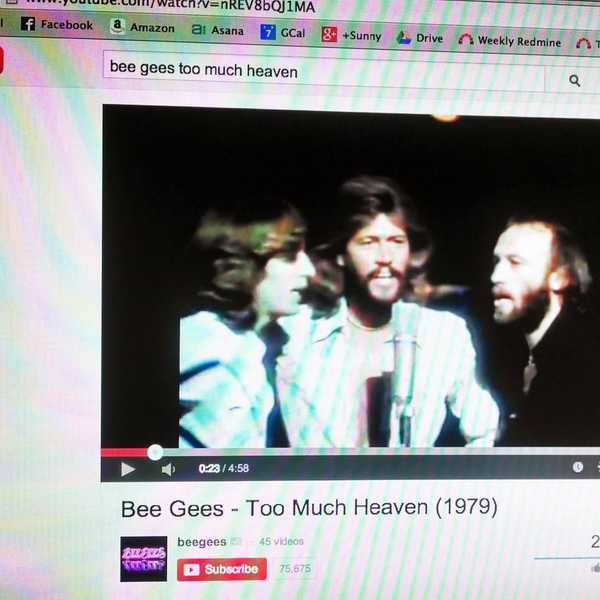Exploring The Depths Of "Nobody Gets Too Much Heaven"
The phrase "nobody gets too much heaven" resonates deeply within the realms of music and philosophy, capturing the essence of life’s balance between joy and sorrow. It evokes a sense of longing for a paradise that seems just out of reach, prompting listeners to reflect on their own experiences and desires. This phrase, which is also the title of a classic song, serves as a reminder that while we may strive for blissful moments, the reality of life often presents us with challenges that temper our expectations.
As we delve into the exploration of "nobody gets too much heaven," we uncover the layers of meaning embedded within its lyrics and the context in which it was created. The song’s themes of love, loss, and the yearning for a better existence resonate with many individuals, making it a timeless piece that continues to touch hearts across generations. It raises questions about the nature of happiness and whether true contentment is achievable in a world filled with uncertainties.
Through this article, we will examine the origins of the song, its impact on popular culture, and the artists who brought it to life. We will also consider how the message of "nobody gets too much heaven" can inspire us to appreciate the moments of joy we do encounter, even when they may feel fleeting. Join us as we embark on this journey to understand the deeper implications of a phrase that has become synonymous with the human experience.
What is the Origin of "Nobody Gets Too Much Heaven"?
The song "Nobody Gets Too Much Heaven" was performed by the popular band the Bee Gees, whose harmonies and lyrical depth have left a lasting impact on the music industry. Released in 1979, it became an instant hit, embodying the disco era while also conveying a profound message about love and the pursuit of happiness.
Who Wrote the Song and What Inspired its Creation?
The Bee Gees, consisting of brothers Barry, Robin, and Maurice Gibb, penned the song. Their unique songwriting style combines heartfelt lyrics with infectious melodies. The inspiration for "Nobody Gets Too Much Heaven" came from their desire to explore the complexities of love and the idea that while we may dream of paradise, achieving it can be elusive.
Can You Provide a Brief Biography of the Bee Gees?
| Full Name | The Bee Gees |
|---|---|
| Members | Barry Gibb, Robin Gibb, Maurice Gibb |
| Founded | 1958 |
| Genres | Pop, Rock, Disco |
| Famous Hits | Stayin' Alive, Night Fever, How Deep Is Your Love |
| Legacy | Inducted into the Rock and Roll Hall of Fame |
What Themes Are Explored in "Nobody Gets Too Much Heaven"?
The themes of "Nobody Gets Too Much Heaven" delve into the contrasts between hope and despair, love and loss. The lyrics suggest that while we may seek heavenly experiences, life often presents us with trials that test our resilience. This duality invites listeners to reflect on their own lives and the moments that shape their perceptions of happiness.
How Did the Song Perform on Music Charts?
What Impact Did "Nobody Gets Too Much Heaven" Have on Popular Culture?
The impact of "Nobody Gets Too Much Heaven" extends beyond the music charts. The song has been featured in various films, television shows, and commercials, showcasing its timeless relevance. Its message continues to inspire new generations of artists and fans alike, proving that the quest for happiness is a universal pursuit that transcends time and cultural boundaries.
How Can We Interpret the Message of "Nobody Gets Too Much Heaven" in Our Lives?
As we reflect on the message of "Nobody Gets Too Much Heaven," it becomes clear that it encourages us to appreciate the small moments of joy and connection in our lives. It serves as a reminder that while we may seek perfection, it is often the imperfections and challenges that define our journey. By embracing the present and finding beauty in the ordinary, we can cultivate a sense of fulfillment that transcends the fleeting nature of happiness.
What Lessons Can We Learn from "Nobody Gets Too Much Heaven"?
- Embrace Impermanence: Happiness is often temporary, so cherish each moment.
- Value Relationships: Love and connection bring meaning to our lives.
- Find Joy in the Journey: The pursuit of happiness is a journey, not a destination.
- Stay Resilient: Challenges shape us and can lead to growth.
In Conclusion: How Does "Nobody Gets Too Much Heaven" Resonate with Us Today?
In conclusion, "Nobody Gets Too Much Heaven" serves as a poignant reminder of the complexities of human emotion and the pursuit of happiness. Its message resonates deeply in today's fast-paced world, where individuals often find themselves in search of meaning amidst chaos. By embracing the lessons embedded in this timeless song, we can navigate life's challenges with grace and gratitude, ultimately finding our own version of heaven in the moments that truly matter.
Article Recommendations
- Randy Adams Face Accident
- Black Comedians Who Passed Away
- Rebecca Ferguson Son
- Kavan Smith
- Brooklyn Decker Naked
- Damon Wayans
- Noel Fielding Relationships
- Tim Mcgraw Diddy
- Elaine Andriejanssen
- Martha Borg Age


